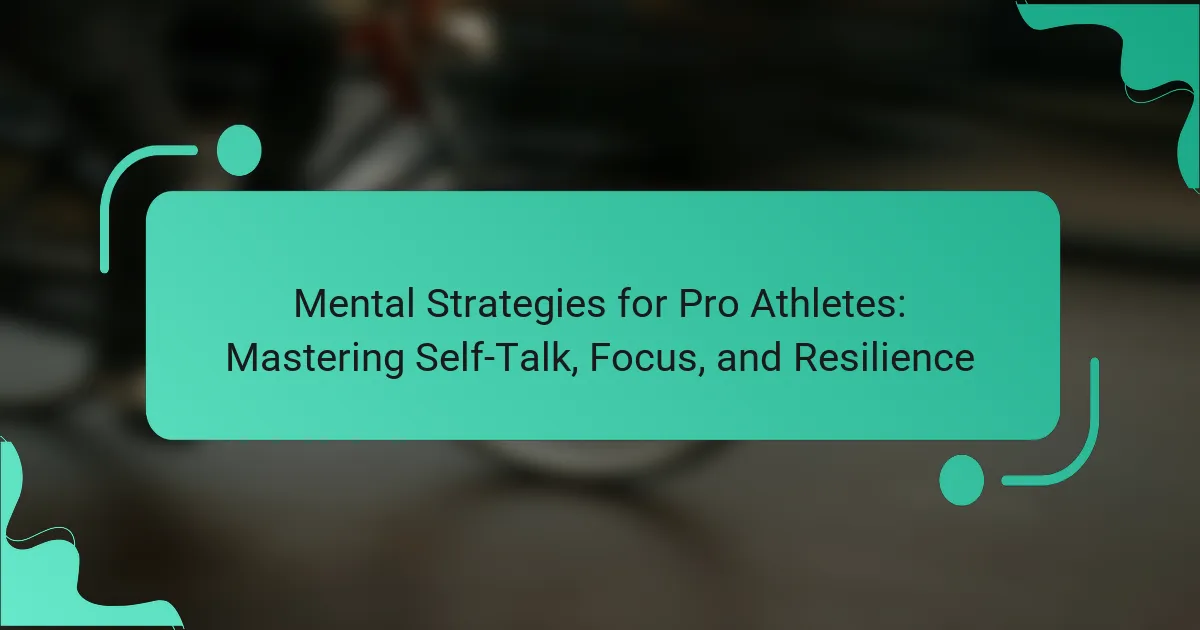Pro athletes face immense pressure, making mental strategies essential for peak performance. This article explores the impact of self-talk on confidence and focus, the role of visualization techniques, and the importance of resilience through self-reflection. Discover how these strategies can enhance athletic performance and foster a growth-oriented mindset. Implementing positive affirmations and mindfulness can help athletes overcome negative thoughts and maximize their potential.

How Does Self-Talk Influence Athletic Performance?
Self-talk significantly enhances athletic performance by shaping mindset and focus. Positive self-talk boosts confidence, reduces anxiety, and improves resilience during competition. Athletes using constructive internal dialogue report better concentration and motivation. Research shows that athletes who engage in positive self-talk outperform peers, highlighting its role as a unique mental strategy in sports psychology.
What Are the Key Components of Effective Self-Talk?
Effective self-talk involves positive affirmations, realistic goal-setting, and constructive feedback. These components enhance mental resilience and focus in pro athletes. Positive affirmations boost confidence, while realistic goals provide direction. Constructive feedback promotes growth and adaptation. Together, these strategies foster a winning mindset essential for peak performance.
How Can Positive Self-Talk Enhance Focus?
Positive self-talk significantly enhances focus by promoting a positive mindset and reducing distractions. This mental strategy allows pro athletes to concentrate on their performance and goals. Research indicates that athletes using positive self-talk experience improved concentration, leading to better outcomes in high-pressure situations. For instance, a study found that self-affirmation techniques can increase focus and reduce anxiety during competitions. By fostering a constructive internal dialogue, athletes can maintain clarity and resilience, essential for peak performance.
What Techniques Foster Positive Self-Talk?
Positive self-talk techniques include affirmations, visualization, and reframing negative thoughts. These methods enhance mental resilience and focus for pro athletes.
Affirmations involve repeating positive statements to boost confidence. Visualization entails mentally picturing successful performance, creating a strong mental blueprint. Reframing negative thoughts transforms them into constructive insights, fostering a growth mindset.
Research shows that consistent practice of these techniques can lead to improved performance and mental well-being. Athletes who utilize these strategies often report higher levels of motivation and reduced anxiety.
How Can Visualization Support Self-Talk Strategies?
Visualization enhances self-talk strategies by creating vivid mental images that reinforce positive affirmations. This technique allows athletes to mentally rehearse successful performances, boosting confidence and focus. Research indicates that visualization can improve resilience by helping athletes cope with stress and setbacks. By visualizing desired outcomes, athletes can align their self-talk with their goals, leading to improved performance.

What Are the Unique Aspects of Inner Dialogue for Athletes?
Inner dialogue for athletes is unique due to its focus on performance enhancement, mental resilience, and self-motivation. This internal conversation shapes athletes’ mindsets, influencing their focus and emotional regulation during competitions.
One unique aspect is the use of positive self-talk, which can significantly improve confidence and reduce anxiety. Athletes often employ specific phrases or mantras to reinforce their strengths and maintain concentration, especially in high-pressure situations.
Additionally, athletes engage in visualization techniques, where inner dialogue complements mental imagery. This combination helps them rehearse movements and strategies, enhancing muscle memory and performance outcomes.
Lastly, resilience is fostered through self-reflection in inner dialogue. Athletes analyze past performances, learn from mistakes, and adapt their mental strategies, creating a growth-oriented mindset crucial for long-term success.
How Does Inner Dialogue Differ Between Sports?
Inner dialogue varies significantly across sports due to differing mental demands and competitive contexts. For example, individual sports like tennis require intense focus on self-talk to manage pressure, while team sports like football emphasise communication and collective resilience. Athletes in high-stakes environments often utilize unique self-talk strategies tailored to their specific sport, enhancing performance through targeted mental frameworks. Understanding these distinctions helps athletes adopt effective mental strategies, improving self-talk, focus, and resilience in their respective disciplines.
What Role Does Self-Talk Play in Building Resilience?
Self-talk significantly enhances resilience by shaping mental responses to challenges. Positive self-talk fosters a growth mindset, enabling athletes to view setbacks as opportunities for improvement. This approach reduces stress and increases focus, which are essential for peak performance. Research indicates that athletes employing constructive self-talk report higher confidence levels and better coping strategies during competition. By consciously directing their inner dialogue, athletes can build mental fortitude and sustain motivation, ultimately leading to improved performance outcomes.
How Can Athletes Develop a Resilient Mindset?
Athletes can develop a resilient mindset through focused mental strategies. Key techniques include mastering self-talk, maintaining concentration, and embracing challenges. Positive self-talk fosters confidence and reduces anxiety, while sustained focus enhances performance under pressure. Embracing challenges cultivates resilience, allowing athletes to learn from setbacks and persist in adversity.

What Rare Self-Talk Techniques Can Elevate Performance?
Rare self-talk techniques can significantly enhance performance by fostering a positive mindset and resilience. One effective method is visualization, where athletes mentally rehearse successful outcomes, boosting confidence and focus. Another technique is affirmations, which involve repeating positive statements to reinforce self-belief and motivation. Additionally, using metaphors can help athletes frame challenges in a relatable way, making them easier to tackle. These techniques, though less commonly discussed, offer unique avenues for athletes to elevate their mental game.
How Can Athletes Utilize Affirmations Effectively?
Athletes can utilize affirmations effectively by integrating them into their daily routines. Consistent practice enhances self-belief and mental resilience.
1. Identify specific goals and create tailored affirmations that resonate personally.
2. Repeat affirmations daily, ideally in the morning or before competitions.
3. Visualize success while reciting affirmations to strengthen mental imagery.
4. Use affirmations to counter negative self-talk, replacing doubts with positive statements.
By focusing on these strategies, athletes can enhance their performance and maintain a positive mindset.
What Are the Benefits of Personalized Self-Talk Scripts?
Personalized self-talk scripts enhance mental strategies for pro athletes by improving focus, confidence, and resilience. These scripts provide tailored affirmations that reinforce positive beliefs and combat negative thoughts. As a result, athletes experience reduced anxiety and increased performance consistency. Research indicates that athletes using personalized scripts report a 20% improvement in mental clarity during competitions. This unique approach allows athletes to internalize effective self-talk, leading to better outcomes in high-pressure situations.

How Can Athletes Overcome Negative Self-Talk?
Athletes can overcome negative self-talk by implementing mental strategies that promote positive thinking and resilience. Techniques such as reframing negative thoughts, practicing mindfulness, and using affirmations can significantly enhance an athlete’s mental state. Research indicates that athletes who engage in positive self-talk experience improved performance and reduced anxiety. Additionally, visualization techniques can help athletes create a mental image of success, further combating negative thoughts. Regular practice of these strategies fosters a stronger mindset and greater overall resilience in competitive environments.
What Strategies Help Combat Self-Doubt?
To combat self-doubt, pro athletes should employ mental strategies like positive self-talk, focused visualization, and resilience training. Positive self-talk replaces negative thoughts with affirmations, enhancing confidence. Visualization techniques help athletes mentally rehearse success, reinforcing belief in their abilities. Resilience training builds the capacity to bounce back from setbacks, fostering a growth mindset. These strategies collectively empower athletes to maintain mental toughness and overcome self-doubt.
How Can Athletes Reframe Negative Thoughts?
Athletes can reframe negative thoughts by employing positive self-talk, focusing on controllable aspects, and practicing mindfulness. These strategies enhance mental resilience and performance. For example, replacing “I can’t” with “I will try” shifts mindset. Mindfulness helps athletes stay present, reducing anxiety. Regularly practicing these techniques fosters a positive mental environment, leading to improved outcomes in training and competition.

What Are the Best Practices for Integrating Self-Talk into Training?
To effectively integrate self-talk into training, athletes should focus on positive affirmations, specific goal-oriented phrases, and mindfulness techniques. These practices enhance focus, boost resilience, and improve overall performance.
1. Develop positive affirmations that reinforce self-belief and confidence.
2. Use specific phrases related to training goals to maintain focus during workouts.
3. Incorporate mindfulness techniques to recognize and redirect negative self-talk.
4. Practice self-talk consistently during training sessions to build a habit.
These strategies create a supportive mental environment, allowing athletes to maximize their potential.
How Can Athletes Create a Self-Talk Routine?
Athletes can create a self-talk routine by establishing consistent, positive affirmations that reinforce their focus and resilience. Begin by identifying specific goals and challenges. Next, develop tailored phrases that resonate with personal experiences. Regularly practice these affirmations during training and competition to enhance mental clarity and confidence. Incorporating visualization techniques alongside self-talk can further strengthen this routine, allowing athletes to mentally prepare for various scenarios.
What Common Mistakes Should Athletes Avoid in Self-Talk?
Athletes should avoid negative self-talk, unrealistic expectations, and comparisons with others. These mistakes can undermine confidence and focus. Negative self-talk can create a cycle of doubt, while unrealistic expectations lead to frustration. Comparing oneself to peers can distract from personal progress. Instead, athletes should cultivate positive affirmations and focus on individual goals.
What Expert Insights Can Help Athletes Master Self-Talk?
To master self-talk, athletes should focus on positive affirmations, visualization techniques, and mindfulness practices. Positive self-talk enhances confidence and reduces anxiety, while visualization helps athletes mentally rehearse successful performance. Mindfulness cultivates awareness of thoughts, allowing athletes to reframe negative self-talk into constructive messages. These strategies can significantly improve focus and resilience during competition.
